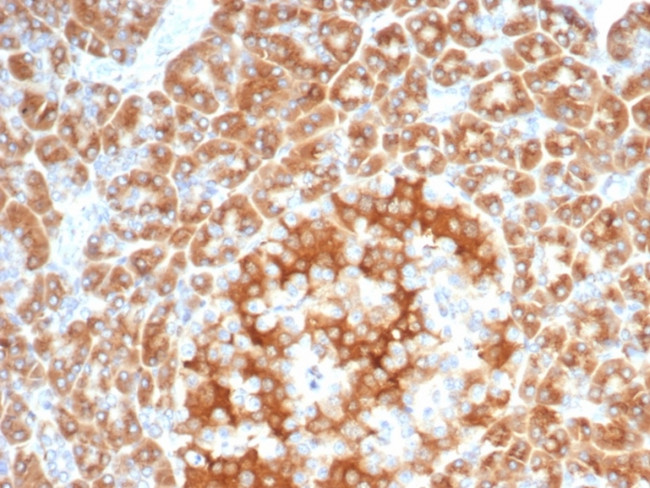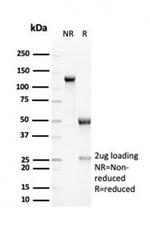Search Thermo Fisher Scientific
NeoBiotechnologies
RCAS1/Estrogen Receptor Binding Site Associated Antigen 9 Recombinant Rabbit Monoclonal Antibody (EBAG9/7033R)
Product Details
9166-RBM3-P1
Species Reactivity
Host/Isotype
Expression System
Class
Type
Clone
Immunogen
Conjugate
Form
Concentration
Purification
Storage buffer
Contains
Storage conditions
Shipping conditions
Product Specific Information
Antibody is stable for 24 months.
Positive Control: MCF-7, Jurkat or 293 cell lysates. Human skeletal muscle tissue. Cellular Localization: Golgi apparatus.
Specificity Comments: EBAG9, also known as RCAS1, is an estrogen-transcribed protein. Soluble and membranous RCAS1 proteins may play a role in the immune escape of tumor cells by promoting T lymphocyte inhibition of growth and apoptosis. RCAS1 is expressed in a wide variety of cancers, including uterine, ovarian, and lung cancer cells, and acts as a ligand for a putative receptor present on peripheral lymphocytes. RCAS1 is highly expressed not only in cancer cells but also in non-tumor bile duct cells subject to immune attack. RCAS1 inhibits the in vitro growth of receptor-expressing cells and induces apoptosis, contributing to the ability of tumor cells to evade host immune surveillance. High expression of RCAS1 significantly correlates with tumor progression and with poor outcome for many cancer patients.
Target Information
This gene was identified as an estrogen-responsive gene. Regulation of transcription by estrogen is mediated by estrogen receptor which binds to the estrogen-responsive element found in the 5'-flanking region of this gene. The encoded protein is a tumor-associated antigen that is expressed at high frequency in a variety of cancers. Two transcript variants differing in the 5' UTR, but encoding the same protein, have been identified for this gene.
For Research Use Only. Not for use in diagnostic procedures. Not for resale without express authorization.
References (0)
Bioinformatics
Protein Aliases: BAG9; cancer associated surface antigen; cancer associated surface antigen RCAS1; Cancer-associated surface antigen RCAS1; estrogen receptor binding fragment associated gene 9; Estrogen receptor-binding fragment-associated gene 9 protein; HGNC:3123; receptor binding cancer antigen expressed on SiSo cells; Receptor-binding cancer antigen expressed on SiSo cells
Gene Aliases: EB9; EBAG9; PDAF; RCAS1
UniProt ID: (Human) O00559
Entrez Gene ID: (Human) 9166

Performance Guarantee
If an Invitrogen™ antibody doesn't perform as described on our website or datasheet,we'll replace the product at no cost to you, or provide you with a credit for a future purchase.*
Learn more
We're here to help
Get expert recommendations for common problems or connect directly with an on staff expert for technical assistance related to applications, equipment and general product use.
Contact tech support


